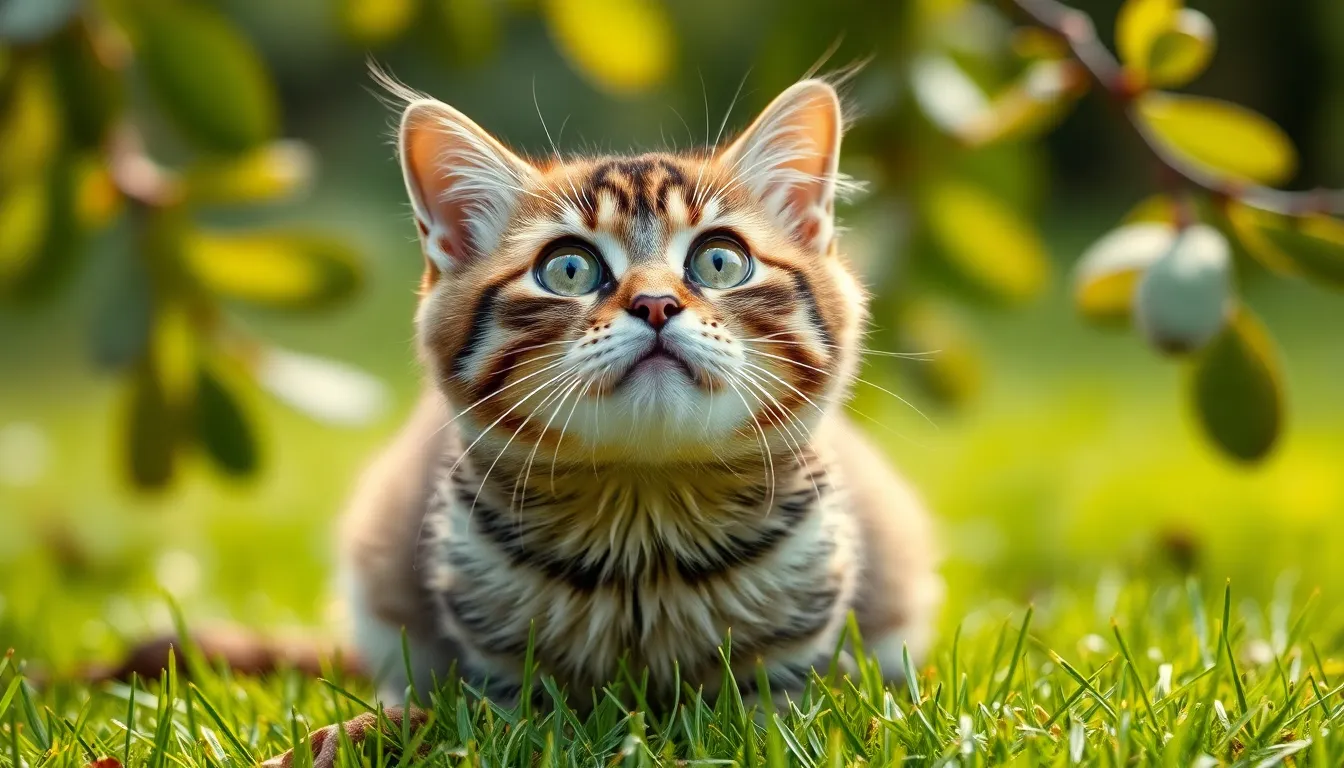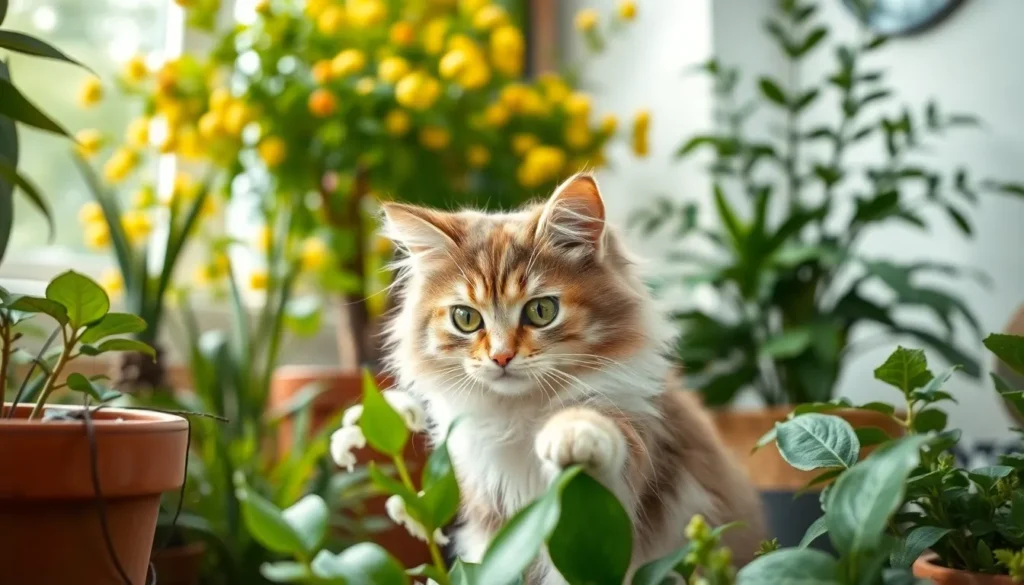Table of Contents
ToggleEucalyptus trees are known for their refreshing scent and medicinal properties, but pet owners often wonder if these plants pose a risk to their furry friends. Cats are naturally curious creatures, and their tendency to explore can lead them to nibble on various plants, including eucalyptus. Understanding the potential dangers is crucial for keeping cats safe and healthy.
While eucalyptus is beloved for its aroma and benefits to humans, it contains compounds that can be harmful to cats. Symptoms of eucalyptus toxicity can vary, impacting a cat’s health in various ways. In this article, we’ll dive into the specifics of eucalyptus toxicity in cats, helping pet owners make informed decisions about their home environment.
Overview of Eucalyptus
Eucalyptus plants, known for their aromatic leaves and diverse varieties, pose risks to feline health. Understanding these plants can help pet owners make informed decisions about their home environments.
Eucalyptus Plant Varieties
Eucalyptus comprises over 700 species, some of which are more common in households. Notable varieties include:
- Eucalyptus globulus (Blue Gum): Often found in forests, it’s known for its oil extraction.
- Eucalyptus citriodora (Lemon Eucalyptus): Valued for its lemon scent and used in insect repellents.
- Eucalyptus polyanthemos (Red Box): Recognized for its decorative qualities and appealing aroma.
While some species may appear harmless, all eucalyptus varieties contain compounds like eucalyptol, which can be toxic to cats.
Common Uses of Eucalyptus
Eucalyptus finds applications across various sectors. Common uses include:
- Aromatherapy: Oils derived from eucalyptus aid in relaxation and respiratory relief.
- Medicinal Products: Cough syrups and ointments often incorporate eucalyptus oil for its antiseptic properties.
- Household Cleaners: Its natural antibacterial qualities contribute to the formulation of eco-friendly cleaning products.
- Insect Repellents: The plant’s natural scent helps deter pests, making it popular in repellents.
Awareness of these uses is crucial, as exposure to eucalyptus products can still pose risks to cats.
Toxicity of Eucalyptus

Eucalyptus is toxic to cats, leading to various health issues when ingested or exposed to its essential oils. Understanding the symptoms and factors influencing toxicity aids pet owners in safeguarding their feline companions.
Symptoms of Eucalyptus Poisoning in Cats
Symptoms of eucalyptus poisoning in cats may vary based on the amount consumed and individual sensitivity. Common signs include:
- Vomiting: Frequent or persistent vomiting occurs shortly after ingestion.
- Diarrhea: Loose stools may develop, leading to dehydration.
- Lethargy: Cats may become overly tired or less active than usual.
- Tremors: Muscle tremors or seizures may indicate severe toxicity.
- Difficulty breathing: Respiratory distress or difficulty breathing signals urgent care is needed.
Prompt acknowledgment of these symptoms enables timely veterinary intervention.
Factors That Influence Toxicity
Several factors can influence the level of toxicity eucalyptus presents to cats, including:
- Dose Amount: Smaller amounts may cause mild symptoms, while larger doses lead to severe reactions.
- Individual Sensitivity: Some cats may exhibit heightened sensitivity to eucalyptus compounds, even with minimal exposure.
- Underlying Health Conditions: Pre-existing health issues may exacerbate reactions, making certain cats more susceptible.
- Type of Eucalyptus: Different eucalyptus species contain varying levels of eucalyptol and other toxic compounds, affecting their potential harm.
Being aware of these factors helps pet owners assess risks and protect their cats from eucalyptus exposure.
Safe Alternatives to Eucalyptus
Exploring non-toxic plants can provide cat owners with safe alternatives to eucalyptus. These plants offer aesthetic appeal without health risks for feline companions.
Non-Toxic Plants for Cats
Safe options include the following plants:
- Catnip (Nepeta cataria): Cats are attracted to its scent, promoting playful behavior.
- Spider Plant (Chlorophytum comosum): This resilient plant is safe and helps purify the air.
- Bamboo Palm (Chamaedorea seifrizii): It thrives indoors and adds a tropical feel without toxicity.
- Boston Fern (Nephrolepis exaltata): This lush greenery offers humidity and is non-toxic to cats.
- Areca Palm (Dypsis lutescens): Known for its elegant fronds, it’s safe for pets.
These plants create a cat-friendly environment while still enhancing home décor.
Benefits of Having Houseplants
Houseplants provide several advantages:
- Air Purification: Many plants filter indoor air pollutants, improving air quality.
- Stress Reduction: The presence of greenery can lower stress levels and increase overall well-being.
- Aesthetic Appeal: Houseplants add color and life to indoor spaces, elevating the home atmosphere.
- Improved Humidity: Plants release moisture, benefiting skin and respiratory health, especially in dry climates.
Integrating non-toxic houseplants enriches a home environment while safeguarding feline health.
What to Do If Your Cat Ingests Eucalyptus
Prompt action is crucial if a cat ingests eucalyptus. Knowing the immediate steps can help mitigate potential health risks.
Immediate Steps to Take
- Assess the Situation: Evaluate the amount of eucalyptus consumed. Determine whether it was the plant or a product containing eucalyptus.
- Monitor Symptoms: Observe for signs of toxicity, including vomiting, diarrhea, lethargy, or any unusual behavior. Early detection aids in treatment progression.
- Remove Access: Prevent further exposure by removing any remaining eucalyptus plants or products from the cat’s vicinity.
- Rinse Mouth: If safe to do so, gently rinse the cat’s mouth with water to remove any residual eucalyptus material.
- Avoid Home Remedies: Refrain from administering any home remedies or medications without veterinary advice.
When to Contact a Veterinarian
- Seek Immediate Care: Contact a veterinarian if symptoms of toxicity appear, or if the cat ingested a significant quantity of eucalyptus.
- Provide Information: Share details about the specific eucalyptus type, the amount ingested, and any symptoms observed. This coverage helps the vet assess the risk and provide appropriate treatment.
- Follow Professional Guidance: Follow the veterinarian’s instructions carefully, whether for a visit, monitoring, or at-home care.
Eucalyptus poses significant risks to cats due to its toxic compounds. Pet owners should remain vigilant and aware of the symptoms associated with eucalyptus exposure. Recognizing the signs of toxicity is crucial for ensuring a cat’s well-being and can lead to timely veterinary care.
Creating a safe home environment involves choosing non-toxic plants that are safe for feline companions. By opting for alternatives like catnip or spider plants, owners can enjoy the benefits of greenery without jeopardizing their pets’ health. Prioritizing safety will not only protect cats but also enhance the overall living space.



